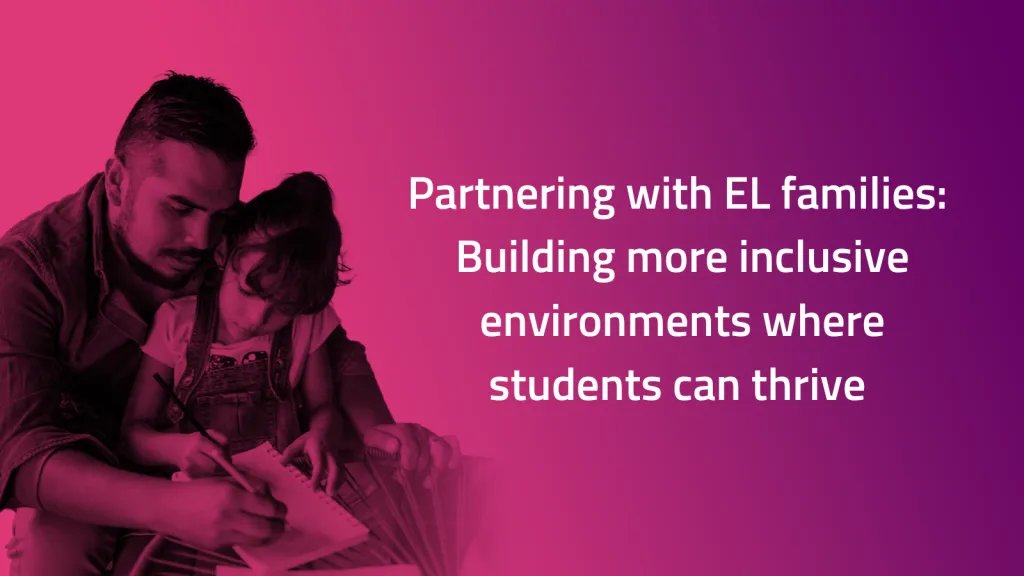See how Ellevation's unified ELD solution can drive student growth. Register now for our webinar on February 18.
Partnering with EL families: Building more inclusive environments where students can thrive


Partnering with EL families: Building more inclusive environments where students can thrive
Collaboration between stakeholders is key for ensuring that English learners (ELs) are set up for success. All educators and professionals that support an EL - classroom teacher(s), specialists, counselors - bring their unique expertise and perspective to the table when developing support plans for the student. But no one has deeper insights into students’ lives than their families, making them essential partners in the educational process.
Getting families of our multilingual learners involved in processes like instructional planning and goal-setting may require us to consider some cultural expectations first. In many cultures, education is traditionally seen as the domain of teachers. Families may step back and leave decision-making to educators, often only monitoring grades or focusing on key milestones like college acceptance.
Understanding this different mindset, and working collaboratively with families to feel comfortable building up their involvement in their child’s education will greatly enrich the educational experience for our students.
We spoke more about this topic with two of our friends at WCEPS: Yvonne Williams, the Director of Multilingual Learner Educator Engagement, and Amy King, the Associate Director of Educator Engagement. They shared insights on the importance of parent advocacy and involvement for EL families, and how to take this from an aspiration to a reality.
Can you speak to the importance of parent advocacy and engagement during the assessment cycle, goal setting, and instructional planning processes for multilingual learners (MLs)?
Yvonne Williams: “Parent advocacy and engagement are crucial in shaping positive educational experiences for multilingual learners, especially for newcomers. An important consideration is to involve families during any classroom or assessment goals. We need to go beyond the typical form of involvement and truly engage families.
We know research states that when families participate in these processes, they can bring unique insights. Specifically, they can share about their child' s cultural background, learning style, and language development, which can inform and support instructional approaches. By engaging families, schools gain access to trust and mend the distance that, in some cases, have caused barriers. Having a foundational understanding of effective engagement fosters a supportive environment that values the student’s linguistic and cultural identity.
This is especially powerful for newcomers, who may be navigating an entirely new educational system while learning a new language. When families are part of the discussion on assessment and goal-setting conversations, they become true partners in the learning journey. Together, this collaboration promotes a strong community or partnership and newcomers find the encouragement, resources, and culturally responsive support they need to truly thrive.”
How can we create opportunities for ML families to be fully leveraged, giving them a seat at the table when setting rigorous goals for their child?
Amy King: “We know that family engagement is essential to student success, especially for multilingual learners. But all too often we may fail to clearly communicate the benefits of their involvement and to provide opportunities for them to share their insights and aspirations. Fostering an inclusive environment where families feel welcomed and empowered to participate can help us create educational pathways that honor both family perspectives and the expertise of educators.
When families of multilingual learners, particularly those of newcomers, are not actively involved, educators risk missing out on valuable insights that could enhance students' learning experiences. Without family involvement, teachers may overlook unique strengths, experiences, and challenges that are crucial to understanding the whole child.
Families can offer context about prior schooling, literacy in the home language, and personal interests that could make learning more meaningful and culturally relevant. Additionally, families are in a unique position to provide valuable information relating to students' adaptability, resilience, and cultural flexibility.”
By engaging families in student learning, we can collectively build a more inclusive, culturally responsive approach that truly supports English learners on their path to success. To learn more about meaningful family engagement for English learners, you can watch the recording of Amy and Yvonne’s session - Building Bridges: Strengthening Connections with Families of Newcomers to Achieve Academic Success - shown at our 2024 IMPACT Virtual Conference.